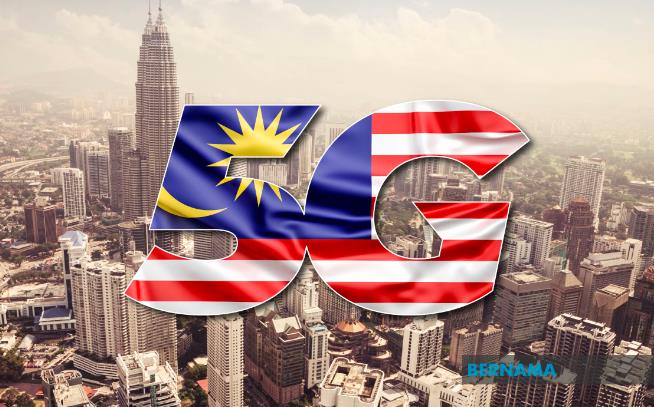5G SAGA: MALAYSIA TO GET DUAL-NETWORK MODEL

The telecommunication sector witnessed some major decisions by the government in 2023, including the shift in implementation of the 5G network from a single wholesale network model to a dual-network model.
On 3rd May, Communications and Digital Minister Fahmi Fadzil announced that the government has decided to implement a dual-network once Digital National Bhd's (DNB) 5G rollout has reached 80% coverage of populated areas (CoPA).
DNB is a special purpose vehicle established in 2021 under the Ministry of Finance and is now the sole owner of the 5G spectrum network, soon to be operating alongside the second network which is yet to be finalised.
To facilitate the transition, the Ministry of Communications and Digital (KKD) has announced the establishment of a special task force, jointly chaired by Treasury secretary-general Datuk Johan Mahmood Merican and KKD secretary general Datuk Mohamad Fauzi Md Isa with the Malaysian Communications and Multimedia Commission (MCMC) as the secretariat.
As of mid-November 2023, the 5G network coverage in Malaysia has reached 73% of populated areas, with the adoption rate at 9.1% as of September.
GlobalData principal analyst Alfie Amir said the second wholesale network will provide more control and flexibility for telecommunication companies (telcos) with their 5G network.
“This will also drive wider innovations such as collaboration with preferred partners; leveraging 5G features like network slicing, multi-access edge computing (MEC) and aligning coverage with business strategy,” he told Bernama.
DNB remains committed to the nation's 5G agenda
To support the country's 5G network development, smooth deployment remains the top priority for the mobile network operators (MNOs). Five telcos have agreed to take up equity stakes in DNB.
The five MNOs - namely CelcomDigi Bhd, Maxis Bhd, Telekom Malaysia Bhd, U Mobile Sdn Bhd and YTL Communications Sdn Bhd - have executed their share subscription agreement (SSA) to take up an accumulative 70% stake in the single wholesale network.
Upon the successful due diligence, the telcos will inject RM233 million each to acquire a 14% stake.
The government, through the Minister of Finance (Incorporated) (MoF Inc) will retain the remaining 30% and hold a Special Share.
CelcomDigi's integration exercise
In June, CelcomDigi officially commenced its full-scale programme to build a future digital network by integrating and modernising the largest 4G network in Malaysia with the latest long-term evolution (LTE) and 5G-ready technologies.
The programme includes consolidating the respective 12,000 sites from Celcom and Digi into a single largest network deployment of 18,000 sites, following their successful merger back in December 2022.
CelcomDigi chief executive officer Datuk Idham Nawawi expects the company's integration exercise to reach 30% by the end of this year, a further 40% next year and the remaining 30% in the third year.
Alfie said CelcomDigi Bhd, as the new market leader, has greater control of the market such as higher pricing power, stronger brand, economies of scale and wider distribution level.
"This will also drive other players to drive wider initiatives such as operational efficiency, service experience, product innovation and customer experience to close the gap with CelcomDigi.
"Nevertheless, the integration between Celcom and Digi could also lead to issues such as customer experience, service disruption, redundancies, and brand confusion," he added.
Telecom sector outlook
GlobalData forecast that the overall telecommunications market in Malaysia - both enterprise and consumer segment - is maturing and is expected to grow at only 2.6% year-on-year (y-o-y) in 2024 to RM32.4 billion.
This trend is also consistent with the telecom sector in other developed countries.
Alfie noted that between the mobile and fixed sectors, mobile services would increase by 3.4% y-o-y in 2024 to RM23.9 billion driven by the growth in data and IoT revenues but cushioned by the decline in legacy voice and messaging services.
He added that 5G adoption would grow and account for 12% of the total mobile users by the end of 2024, while fixed services would remain flat at RM8.5 billion with only 0.5% y-o-y growth next year.
The strong growth of broadband services (7.1% y-o-y) driven by higher bandwidth and wider adoption would be offset by the continuous decline of traditional fixed voice services, said Alfie.
Enhancing rakyat's connectivity
In a move to ensure more people can enjoy and experience 5G connectivity, the government had on Aug 29 launched the 5G Rahmah package as well as the Civil Servant Rahmah postpaid package.
The packages and incentives were a manifestation of the Madani Government's effort in collaboration with five major MNOs as well as phone manufacturing companies namely Samsung Malaysia Electronics and Honor Malaysia.
